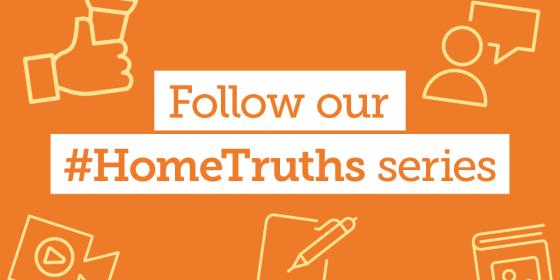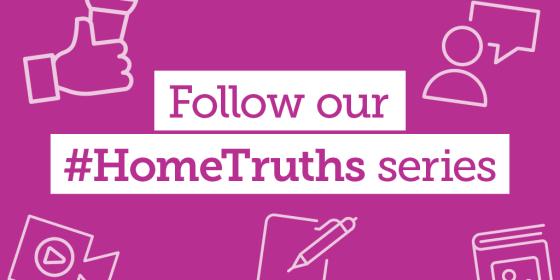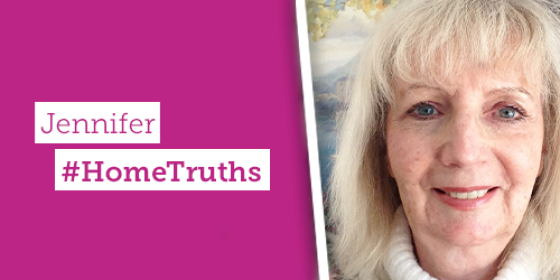 Home Truths: Changes to care, part 1
Home Truths: Changes to care, part 1
My mother is 92, has dementia and atrial fibrillation – a heart murmur which impacts her oxygen levels. As a result of her dementia, mum often forgets to use her walker and so has a broken neck from a recent fall. She's also had pneumonia three or four times.
Early on, when coronavirus (COVID-19) was still only in China, my mum’s GP told me that my mum’s health means that she wouldn’t be taken to an Intensive Care Unit if she fell ill and wouldn’t be resuscitated. I was pressed early on to think about what my mum would want in terms of care; if she got coronavirus I don’t think she would survive it, so I have to be really careful about our safety and wellbeing.
The last thing that my mother told me she wanted, when she had capacity, was that she wants to stay in her own home, so I am trying to do that for her. To allow her to stay at home, I have been a live-in carer for her for three years now because mum needs 24-hour care.
Early on, when coronavirus (COVID-19) was still only in China, my mum’s GP told me that my mum’s health means that she wouldn’t be taken to an Intensive Care Unit if she fell ill and wouldn’t be resuscitated.
Normally mum goes to a day centre once a week and a sitter comes in for around another three hours a week so that I can catch up on sleep or do our weekly shop. However, this has currently stopped, which means I am delivering mum’s care 24-hours a day.
A lot of my social life is usually based around carers, I go to a Memory Café and Carers’ Coffee mornings.I am able to keep in touch with people from my Carers’ Coffee morning group via Whatsapp, or we call one another. I get a lot of support from other carers, and ideas about how to manage particular problems – this is the same both before and during the coronavirus outbreak. The lockdown hasn’t really changed my ‘normal’ social life.
I get migraines if I get really tired – I went through a stage where I had a permanent headache for about three weeks – it was sleep deprivation where my health was being affected severely, according to the doctor. It was impacting her care as well. I have to be really careful and make sure that I take active steps to ensure that I don’t get that tired. It means building in periods of relaxation during the day, as well as respite, and it is good to talk to others about this.
I try to do de-stressing activities, but so far I have not had a lot of energy for it. If my mum feels warm enough I try to get out in the garden as a way of de-stressing. It is good for growing things which we can eat, getting fresh air, and as a form of exercise. Another thing I enjoy is reading, which takes me out of the situation for a while. We also like to do jigsaws together.
I try to do de-stressing activities, but so far I have not had a lot of energy for it.
I am a supporter of anything which raises the impact of people with dementia. I feel strongly that people with dementia are a forgotten group, particularly with what is happening with care homes. It wasn’t until I was in this situation that I realised how isolating being a carer also is – the minute you mention what you are doing you see people’s eyes glaze over, like they can’t understand why you do it.
Some of my friends think I'm mad, which is why I like to be able to speak to my ‘carer friends’ for support, as they understand. The thing is, I have worked in social care throughout my professional life so of course I am going to care for my mum – caring is my driving force and I am not going to change that now. But, I need to be realistic about the future. My gift of care is my way of giving back to my mum for all she has done for me and I will do it willingly for as long as I am able and as long as I can safely meet her needs.
'Lucy' wanted to remain anonymous.
During the COVID-19 outbreak, Independent Age is highlighting the importance of social care in keeping older people safe. This includes the role of informal carers and ensuring that vital information is conveyed to those supporting someone in need, in a clear comprehensive way.
You can help us improve the care system by joining Independent Age’s online campaign network. We’ll keep you updated on our activities and how you can get involved.
 Home Truths: Changes to care, part 2
Home Truths: Changes to care, part 2
 Home Truths: Accessing my medication
Home Truths: Accessing my medication
 Home Truths: Life in Isolation
Home Truths: Life in Isolation